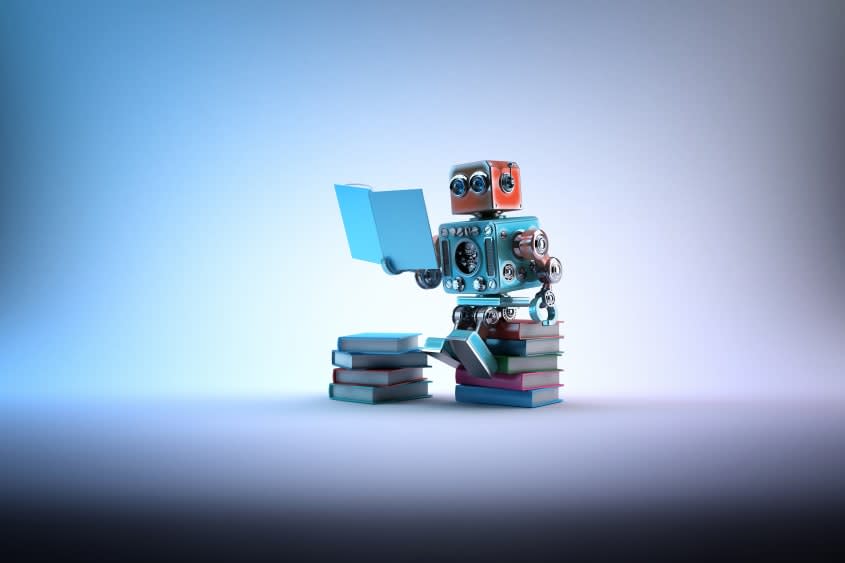7 sci-fi books that seem to predict the future

- Oops!Something went wrong.Please try again later.
- Oops!Something went wrong.Please try again later.
Science fiction authors and, by extension, their work are often ahead of their time. Intentional or not, when satirizing or commenting on their society, sci-fi books often make eerily accurate predictions about technological advancements and societal changes that have since become a reality. These are some prescient sci-fi books that accurately predict the future.
"The Minority Report" by Philip K. Dick (1956)
This 1956 novella was turned into a film, 2002's "Minority Report," and TV series. The story takes place in a future where technology helps the police arrest criminals before they ever commit a crime. The book anticipates increased police surveillance and profiling nearly half a century later. Now that we have "algorithms trying to predict people's habits, increased surveillance technology, and even iris and retinal scans," Book Riot said Dick's novella "seems more prescient than ever." Order here.
"Neuromancer" by William Gibson (1984)
Gibson is credited with coining the word cyberspace in his short story "Burning Chrome." He defines it as "widespread, interconnected digital technology," similar to today's internet. He popularized the concept with his first novel, "Neuromancer," which Insider calls a "futuristic crime caper" that follows a hacker and cyber thief who regains the ability to "jack in" to cyberspace with a miracle cure. The cyberpunk novel is regarded as a predecessor for stories like "The Matrix." Gibson's interpretation of an interactive virtual world is reminiscent of augmented reality, like the technology behind AR headsets today. Order here.
"1984" by George Orwell (1949)
This classic dystopian novel is not the first sci-fi book to be called prophetic, but it has arguably been one of the most impactful in the real world. Concepts like Big Brother, doublethink and the thought police were born from Orwell's imagined futuristic society ruled by an oppressive government. The book touches on increasingly relevant themes, such as mass surveillance, censorship and propaganda. Set in a dystopian society nearly four decades after World War II, it serves as a warning of the dangers of totalitarianism. Facial recognition technology, like the kind behind the telescreens Orwell imagines, has been central to contemporary debates about pervasive surveillance. Order here.
"Parable of The Talents" by Octavia Butler (1998)
The speculative fiction books by Octavia Butler experienced a bit of a renaissance in 2016 when several writers pointed out the eerie similarities between the authoritarian presidential candidate in Butler's novel "Parable of The Talents" and former President Donald Trump. The character even uses "Make America great again" as a campaign slogan. The story unfolds in a dystopian California plagued by a drought caused by climate change. In a speech at MIT, Butler said the novel was about was not meant to be prophetic. "This was a cautionary tale, although people have told me it was prophecy." Butler added, "All I have to say to that is: I certainly hope not." In 2020, a resurgence in interest in Butler's "Parable" series landed her on The New York Times bestseller list for the first time. Order here.
"Snow Crash" by Neal Stephenson (1992)
Stephenson coined the word metaverse in his 1992 novel, nearly 30 years before Facebook changed its name to Meta in 2021. The characters in "Snow Crash" use virtual reality headsets and a digital world to escape the reality of their bleak surroundings and cramped living conditions. So far, though, the metaverse is struggling to establish itself as the next big thing in tech. Order here.
"A Song for a New Day" by Sarah Pinsker (2019)
Pinsker published her Nebula Award-winning novel about a quarantined world in September 2019, months before the onslaught of the Covid-19 pandemic. In "Song for a New Day," the world has been on lockdown for decades after a deadly virus is unleashed in a terror attack. People rely on drones to get essentials, and large gatherings like concerts are prohibited. The musician's book "goes beyond eerie prognostication," Piotr Orlov said in Pitchfork. "A Song for a New Day" also allows us to reconsider the apparatus at the heart of contemporary music, weighing its commercial and social principles against the rituals and roles live music has long served," Orlov added. Order here.
"Stand on Zanzibar" by John Brunner (1968)
Brunner predicts several societal shifts and events in his 1968 novel, "Stand on Zanzibar." He introduces a world that's "grappling with overpopulation and widening social divides," Insider stated. It's a problem playing out in real time in countries worldwide. He also wrote about cannabis legalization, satellite television, electric vehicles and widespread mass shootings, particularly in schools. Order here.
You may also like
WHO chief warns of pathogens that could be 'even deadlier' than Covid-19
Will the IRS's free online tax filing program kill H&R Block and TurboTax?

